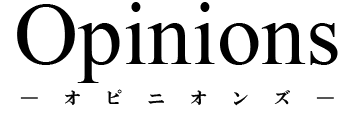
- 記事一覧
- ゲストライター記事一覧
- 移民女性と健康への権利;技能実習生に対する妊娠差別 Migrant women & the right to health; pregnancy discrimination against technical interns
移民女性と健康への権利;技能実習生に対する妊娠差別 Migrant women & the right to health; pregnancy discrimination against technical interns

2019年、神奈川県川崎市で、中国人実習生が、生まれたばかりの男児を民家敷地に放置したとして、保護責任者遺棄罪に問われた。この女性は、寮で男児を出産、そのまま毛布にくるみ、大きめのビニール袋に入れて、川崎市内の民家の玄関付近に置いたという。上司に中国への帰国を迫られることを恐れてのことである。実習生は、保護責任者遺棄罪を認めて懲役1年6ヶ月、執行猶予4年の判決を言い渡され、男児は保護され乳児院へ引き取られた。 (2020/12/29,毎日新聞)
2019年、福岡県福津市でベトナム人実習生が、死産した男児の死体遺棄容疑で逮捕された。福津市内にある実習先の会社の建物内で男児を死産し、そのまま遺体を遺棄した疑いである。(2019/4/18,朝日新聞デジタル)
2020年、岡山県津山市でベトナム人実習生が乳児死体遺棄容疑で逮捕され、妊娠4~5ヶ月の胎児を中絶した疑いで再逮捕された。技能実習生は警察に、妊娠すると祖国に送り返されるとことになるので胎児を中絶したと話した。(2020/12/29, 毎日新聞)
2020年、熊本県芦北町で、ベトナム人技能実習生が妊娠を隠し、誰にも相談できず出産した双子を遺棄した。妊娠、出産が勤務側に伝わればベトナムに強制的に帰国されると思っていた。(2020/12/29,毎日新聞)
2020年、広島県東広島市で、ベトナム人技能実習生が新生児の死体遺棄で逮捕起訴された。帰国を恐れて経営者に伝えなかった。出産したとみられる日の前後も実習先に出勤していた。ただ、医療機関に通った形跡はなく、従業員たちも妊娠に気付いていなかったようだ。(2020/11/13, Japan Today)
技能実習制度の開始は1993年。その後処遇の劣悪さが問題となり、技能実習制度は2009年に、日本政府が建前として謳っていた「研修制度」から本音である「労働」であることを認めたことにより、入管法改正によって労働基準法の対象となった。その後、2017年には、「外国人の技能実習の適正な実施及び技能実習生の保護に関する法律」により、外国人技能実習機構(OTIT)が設立され、技能実習生の保護、適正な実習の実施のための体制が一層強化された。上記に挙げた問題とされる妊娠、出産についても、労働基準法によって、日本人労働者と同様の権利を持つ(労務の軽減、出産前後の休暇、健康保険に加入している場合の出産育児一時金など)とされている。OTITが技能実習生として認定を行った外国人の数は、2018年で389,000人余りである。

2021年3月、野党の質問に対する政府の答弁書の中で、技能実習生の妊娠や出産による実習継続困難届について初めて触れられた。実習実施者又は監理団体が外国人技能実習機構に提出した、技能実習の継続が困難とした届出のうち、妊娠又は出産が理由と把握できるものは637人であることが示された。これは、2017年11月から2020年までのわずか3年の間の人数である。つまり、2日に1人以上が妊娠や出産を理由に実習を中断し、帰国していると考えられる。637人は政府が把握できた人数であり、実際にはもっと多いのではないだろうか。
2019年3月に、法務省入管庁、厚労省、及びOTITは、実習実施者雇用主と監理団体宛に以下のような注意喚起を行っている。「雇用の分野における男女の均等な機会及び待遇の確保等に関する法律10条においては、婚姻妊娠出産等を理由とする不利益扱いの禁止が規定されている。この規定は当然ながら技能実習生にも適用されるものであり、婚姻妊娠出産等を理由として解雇その他の不利益な扱いをすることは認められない。また技能実習生の私生活を不当に制限することは外国人の技能実習の適正な実施及び技能実習生の保護に関する法律第48条2項により禁止されている」
この注意喚起を監理団体や雇用主は遵守しなければならず、監理団体は入国後講習の中で妊娠出産に関する権利について実習生に伝える必要がある。そして、OTITは、結婚妊娠出産を理由に私生活の自由を不当に制限し、解雇などの不利益な扱いを受けることは法律で禁止されていること、さらに、妊娠出産した場合には産前産後休暇を取得することができること、妊娠中の女性は健康診断を受けるための休暇を申請することができることをマニュアルに記載している。
妊娠差別への注意喚起が全国でどの程度実践されているのか、OTITからはデータが発表されていない。実習生による乳児遺棄事件などの報道が増えていることからも、情報発信が不十分であり、技能実習生の権利についての情報を本人たちに隠している雇用者がいるのではないかという推測さえできる。岡山で、最近、妊娠して帰国したベトナム人実習生の知人によると、「妊娠したら研修を中断・中止して帰国しなければならない」というのが常識になっているという。
技能実習生の労働権と人権は法律で保護されている。上述のような死体遺棄事件等の直接的な原因は、実習生の持っている権利を彼らに周知しなかった監理団体及び実習実施者の過失である。注意喚起を出したにもかかわらず、このようなことが起きるということは、保護すべき人たちに情報が届いていないことを表しており、これは、トップダウンの情報発信アプローチの非効率性など、日本社会の構造の問題が絡んでいるとも言える。

妊娠差別と移民女性の問題は、交差性と三重差別という関連概念を用いるなら、「女性」、「妊娠」、「移民」という3つの差別理由があると言える(Fair Labor 2018)。構造が交錯することでより脆弱となるのである。
世界の男女平等ランキングで120位(156カ国)の日本は、働く女性に「マタニティ・ハラスメント」が影響する社会である。妊娠中や出産後間もない日本人女性は、降格や言葉の暴力、解雇などを受けたと報告している(nippon.com 2020)。妊娠により、女性の労働力としての価値を低くみられているのである。さらに、日本ではいまなお女性の避妊薬へのアクセスを改善する必要性が叫ばれている。こうしたジェンダー的な問題は、リプロダクティブ・ヘルス(性と生殖に関する健康)に関する教育の不足や、計画外の妊娠に対する社会的スティグマ(負のイメージ)、特に女性に対するスティグマによって、さらに深刻化している。
一般市民への情報発信の問題に立ち返ると、日本語ができない移民は情報へのアクセスに高い障壁があることが多い。特に現在の移民労働者が搾取されるシステム(社会構造)では、移民労働者が当然持っている権利や受けられるサービス(一般的な労働法における保護、出産休暇などの権利など)を、入国時や研修中に伝えられていない可能性がある。
トップダウンの情報だけでは不十分な場合は、現場での取り組みを強化する必要がある。そのためには、技能実習生が希望すれば日本で産休や出産ができること、中絶ができること、養子縁組や里親を選べることなど、技能実習生の権利について地域社会の意識を高めることから始める必要がある。具体的には、妊娠が発覚したときの母親の選択肢について「やさしい日本語」の資料を増やす、地域の産婦人科や病院で多言語による相談窓口を設ける、避妊具やリプロダクティブ・ヘルスに関する教育を広く社会に浸透させる、などである。
地域レベルでの情報やサービスへのアクセスを改善することは、妊娠中の移民女性だけでなく、女性全般に利益をもたらす。コミュニティの全体的な幸福のために、連帯して取り組むべきである。
2019 January: a Chinese intern was arrested in Kanagawa after abandoning her baby due to fears that her supervisors would force her to return to China (Mainichi 2020).
2019 April: a Vietnamese intern was arrested in Fukuoka for infant corpse abandonment of a stillborn baby (Asahi 2019).
2020 April: a Vietnamese intern was arrested in Tsuyama, Okayama for infant corpse abandonment and re-arrested for suspected abortion of a 4-5 months old fetus. She told the police "I aborted the fetus because getting pregnant as a trainee means being sent back to your home country" (Mainichi 2020).
2020 October: a Vietnamese intern was indicted in Kumamoto for abandoning twins after hiding her pregnancy. She said that she did not know who to talk to and hid her pregnancy because she feared losing her internship and being forcibly returned to Vietnam (Mainichi 2020).
2020 November, a Vietnamese intern was arrested and indicted in Hiroshima for abandoning the body of a newborn child. She didn’t tell her manager for fear of being sent back to Vietnam (Japan Today, 2020).
The Technical Internship Training Program (TITP) was introduced in 1993. It has been internationally criticized for being a recruitment method for low-cost temporary labor fraught with human rights violations. In 2009, the TITP became subject to the Labor Standards Act by the revision of the Immigration Control and Refugee Recognition Act, which recognized interns as workers. In 2017, the Organization for Technical Intern Training (OTIT) was established to manage the program, which includes providing “support and protection for technical intern trainees”. In 2018, the number of workers certified by the OTIT as technical interns was over 389,000.
In response to questioning by the opposition party in March 2021, the government mentioned for the first time that factors of “difficulties in continuing internships” included pregnancy or childbirth among interns. It was revealed that from 2017 to 2020, 637 reports citing reasons of pregnancy or childbirth as a difficulty had been documented. In other words, at least one person every two days is interrupting, or being made to terminate, their training due to pregnancy.
In July 2021, we (Societas Research Institute), contacted the OTIT to inquire about the number of technical interns who were dismissed or returned to their home countries due to pregnancy. They replied, "We do not have an official tally. We cannot disclose it, and have no plans to disclose it.”
Previously, in March 2019, the Ministry of Justice/Immigration Services Agency, the Ministry of Health, Labour and Welfare, and the OTIT issued a joint warning to the implementing and supervising organizations. It was a reminder that Article 9 of the Equal Employment Opportunity Law, which prohibits disadvantageous treatment (e.g., dismissal) on the grounds of marriage, pregnancy, and childbirth, also applies to technical interns. This also means that interns are entitled to the same rights as Japanese working women who become pregnant.
Further, the OTIT manual about technical intern training states that, “It is prohibited by law for technical intern trainees to be subjected to... disadvantageous treatment such as dismissal due to marriage, pregnancy, or childbirth. Furthermore, in case of pregnancy and childbirth, you will be eligible for maternity leave.” In detail, pregnant interns’ rights include receiving modified working hours, lighter workload, and childcare or medical checkup times off.
The responsibility of conveying these labor rights to the interns lies with the implementing and supervising organizations. In theory, the interns’ rights regarding pregnancy and childbirth are to be included in the initial post-arrival training period.
However, no data has been released by the OTIT about the extent to which the warnings against pregnancy discrimination has been put into practice across the country. From the increasing reports of cases such as infant abandonment by interns, the reality shows that information dissemination and adherence to guidelines (by employers) are inadequate.
Recently in Okayama, Vietnamese interns have returned home after becoming pregnant. People who knew them said that it is well known that interns must stop their training and return to their home countries if they become pregnant.
Without a doubt, the government-issued warnings to the supervising and implementing organizations cannot be said to be sufficient. The information has not reached those who it is supposed to protect. It can be said that this is, in many ways, compounded by issues general to Japanese society, such as the ineffectiveness of top-down information dissemination.
However, in the issue of pregnancy discrimination against migrant women, broader structures can be seen to intersect to give rise to this increased vulnerability. Drawing on the related concepts of intersectionality and triple discrimination, pregnant technical interns are discriminated on three grounds: woman, pregnant, and migrant (Fair Labor 2018).
To revisit the issue of information dissemination for the general public, it is often the case that migrants without Japanese proficiency face higher barriers in accessing information. Within the context of this system, which currently functions to exploit temporary migrant workers, it becomes likely that rights and services that migrant workers are entitled to are not conveyed to them upon arrival or during training.
Japan, the 120th country (/156 countries) in the global gender equality ranking, is a society where “maternity harassment” (マタハラ)impacts working women. Japanese women who were pregnant or had recently given birth reported being demoted, verbally harassed, or being fired from their jobs (Nippon.com 2020). That is, the possibility of pregnancy still functions to devalue women’s labor in the workplace. Further, there are still calls for the need to improve access to birth control pills in Japan. These gendered issues are compounded by a lack of education on reproductive health and social stigma against unplanned pregnancies, particularly toward women.
Considering these factors, being at the intersection of woman, pregnant, and migrant (especially as a technical intern) can result in an increased vulnerability.
If top-down information is failing technical interns who become pregnant from accessing and enacting their rights, local approaches should be mobilized. It starts with building general community awareness about the interns’ entitlements to take maternity leave and give birth in Japan if they wish to, have an abortion, or choose adoption or foster care.
Concretely, this can be increasing 「やさしい日本語」materials about the choices available to the mother upon discovering pregnancy, multilingual consultation services at local ob-gyns and hospitals, making contraceptives and education about reproductive health more accessible across the wider community, and increasing awareness about adoption options.
Improving access to information and health services at the local level can benefit not only pregnant migrant women, but women and migrants generally. The intersecting structures identified as potential sources of this increased vulnerability for pregnant migrant women should be addressed in solidarity with these broader groups for the overall wellbeing of the community.
Mainichi, 2020: Why do some foreign trainees in Japan abandon their babies?
Nippon.com, 2020: Study Assesses “Maternity Harassment” in Japanese Workplaces
Asahi, 2019: 男児を死産、そのまま遺棄した疑い 技能実習生を逮捕
Fair Labor, 2018: Triple Discrimination: Woman, Pregnant, and Migrant
Mochizuki, 2021: 彼女がしたことは犯罪なのか。あるベトナム人技能実習生の妊娠と死産

秋吉湖音:公益財団法人橋本財団 ソシエタス総合研究所 研究員
2021年までの3年間の新聞記事から秋吉が考察したものを、橋本が再構成し、文章化。英文は秋吉が作成。
秋吉湖音:公益財団法人橋本財団 ソシエタス総合研究所 研究員
2021年までの3年間の新聞記事から秋吉が考察したものを、橋本が再構成し、文章化。英文は秋吉が作成。
Recently Popular最近よく読まれている記事
-

食べていても痩せる 高齢者終末期のカヘキシア(悪液質)
食べていても痩せる。活発に運動を続けている人なら不思議に思わないが、介護度の高い高齢者にそのようなことが果たして起こるのだろうか。起こるのであれば、それはカヘキシアという病態であれば説明できる。 カヘキシア(悪液質)カヘキシアとは、食欲不振・体重減少・全身衰弱・倦怠感などを呈し、生命予後やQOL(qualit… -

終末期の自然な経過を見極めるとは
長期に渡り胃ろうからの栄養を続けていると、注入した物が食道へ逆流したり、唾液や痰の貯留が増えたりして、吸引を繰り返すことになるが、結局のところ、頻回の吸引も間に合わず、心肺停止状態で発見されることが多い。これでは看取りとは言えない。ここに至るまでの言葉を語れない人の苦しみ。このような事態を避ける智慧… -

自閉症スペクトラムと呼ばれているような障害は、実は障害ではない。生物としての人類のバリエーション(変異)の一つである。
自閉症スペクトラムと呼ばれているような障害は、実は障害ではない。生物としての人類のバリエーション(変異)の一つである。本来は人類の、生息環境に対する適応の一つのあり方だというのが、ニューロダイバーシテイ(脳多様性)という考え方に他ならない(詳しくは正高信男著『ニューロダイバーシテイと発達障害』(北大… -

社会保障分野での普遍主義と選別主義について
介護保険や医療保険では、貧富にかかわらず保険によって9割が給付(自己負担は1割)あるいは、7割が給付(自己負担は3割)される。この様な社会保障の方式は、「普遍主義」といわれている。「普遍主義」は、義務教育や、最近では高等学校の授業料にも適応されている(この場合も裕福な人も貧しい人も同様に無償である)。反… -

飲まず食わず(自発的飲食中止)という選択、VSEDをご存知ですか?
前回(Opinionsで9月24日配信記事)は有馬斉氏による安楽死の分類と、我が国の現状についてお伝えしました。また我が国においては、医師の致死的薬剤の処方による積極的安楽死は、法的に支持されていないということもお話ししました。諸外国では医師による致死的薬剤処方による安楽死が認められている国もありますが、もち… -

医療崩壊
ある日の外来。朝の9時から診察室に座りっぱなしでそろそろ3時間が経過。既に再診患だけではなく、その日の新患も回ってきます。で、そうした中に問題のおじさんがいました。「今、○○クリニックで薬をもらっていまして・・・」「30日分貰っているのですが、お腹が痛くなったので、診てもらいに来ました」「○○先生の紹介…
Writer ライター
-
 受賞作品Opinionsエッセイ
受賞作品OpinionsエッセイOpinionsエッセイの記事を見る
-
 ペンネーム東沖 和季
ペンネーム東沖 和季東沖 和季の記事を見る
-
 ニセコ在住下田 伸一
ニセコ在住下田 伸一下田 伸一の記事を見る
-
 ペンネーム 看護師宇梶 正
ペンネーム 看護師宇梶 正宇梶 正の記事を見る
-
 武蔵野大学大学院大谷 航介
武蔵野大学大学院大谷 航介大谷 航介の記事を見る
-
 一般社団法人村楽東 大史
一般社団法人村楽東 大史東 大史の記事を見る
-
 会社員池松 俊哉
会社員池松 俊哉池松 俊哉の記事を見る
-
 (公財)橋本財団研究助成 成果報告
(公財)橋本財団研究助成 成果報告研究助成 成果報告の記事を見る
-
 横浜市立大学小林 天音
横浜市立大学小林 天音小林 天音の記事を見る
-
 東京西徳洲会病院小児医療センター 小児神経科医師秋谷 進
東京西徳洲会病院小児医療センター 小児神経科医師秋谷 進秋谷 進の記事を見る
-
 公益財団法人地方自治総合研究所 常任研究員坂本 誠
公益財団法人地方自治総合研究所 常任研究員坂本 誠坂本 誠の記事を見る
-
 ペンネームAurora
ペンネームAuroraAuroraの記事を見る
-
 つむぐ株式会社 代表取締役竹村 仁量
つむぐ株式会社 代表取締役竹村 仁量竹村 仁量の記事を見る
-
 岡山大学学術研究院医歯薬学域長谷井 嬢
岡山大学学術研究院医歯薬学域長谷井 嬢長谷井 嬢の記事を見る
-
 ソシエタス総合研究所 研究員Karki Shyam Kumar (カルキ シャム クマル)
ソシエタス総合研究所 研究員Karki Shyam Kumar (カルキ シャム クマル)Karki Shyam Kumar (カルキ シャム クマル)の記事を見る
-
 NPO法人妊娠しぇるとSOS 理事長小林 智子
NPO法人妊娠しぇるとSOS 理事長小林 智子小林 智子の記事を見る
-
 書きたい人のためのwebマガジンOpinions編集部
書きたい人のためのwebマガジンOpinions編集部Opinions編集部の記事を見る
-
 介護福祉士渡口 将生
介護福祉士渡口 将生渡口 将生の記事を見る
-
 相談支援専門員・福祉ネイリストゆき
相談支援専門員・福祉ネイリストゆきゆきの記事を見る
-
 株式会社ありがとうファーム取締役副社長馬場 拓郎
株式会社ありがとうファーム取締役副社長馬場 拓郎馬場 拓郎の記事を見る
-
 ジャーナリスト ペンネームジョワキン
ジャーナリスト ペンネームジョワキンジョワキンの記事を見る
-
 ソシエタス総合研究所 研究員Andi Holik Ramdani(アンディ ホリック ラムダニ)
ソシエタス総合研究所 研究員Andi Holik Ramdani(アンディ ホリック ラムダニ)Andi Holik Ramdani(アンディ ホリック ラムダニ)の記事を見る
-
 ソシエタス総合研究所 研究員Waode Hanifah Istiqomah(ワオデ ハニファー イスティコマー)
ソシエタス総合研究所 研究員Waode Hanifah Istiqomah(ワオデ ハニファー イスティコマー)Waode Hanifah Istiqomah(ワオデ ハニファー イスティコマー)の記事を見る
-
 元芝園団地自治会岡﨑 広樹
元芝園団地自治会岡﨑 広樹岡﨑 広樹の記事を見る
-
 岡山外語学院留学生カーン エムディ マムン
岡山外語学院留学生カーン エムディ マムンカーン エムディ マムンの記事を見る
-
 行政書士板垣 岳人
行政書士板垣 岳人板垣 岳人の記事を見る
-
 Crimson Education教育コンサルタント蘇 暁辰(Xiaochen Su)
Crimson Education教育コンサルタント蘇 暁辰(Xiaochen Su)蘇 暁辰(Xiaochen Su)の記事を見る
-
 神戸大学准教授斉藤 善久
神戸大学准教授斉藤 善久斉藤 善久の記事を見る
-
 ドイツ在住阿部プッシェル 薫
ドイツ在住阿部プッシェル 薫阿部プッシェル 薫の記事を見る
-
 ライター/編集者黒部 麻子
ライター/編集者黒部 麻子黒部 麻子の記事を見る
-
 翻訳家田尻 潤子
翻訳家田尻 潤子田尻 潤子の記事を見る
-
 アブダビ環境庁長官 Environment Agency – Abu Dhabi (ead.gov.ae)シャイカ・サレム・アル・ダヘリ
アブダビ環境庁長官 Environment Agency – Abu Dhabi (ead.gov.ae)シャイカ・サレム・アル・ダヘリシャイカ・サレム・アル・ダヘリの記事を見る
-
 元整形外科医/農園主散木洞人
元整形外科医/農園主散木洞人散木洞人の記事を見る
-
 豊橋技術科学大学パク ミンジョン
豊橋技術科学大学パク ミンジョンパク ミンジョンの記事を見る
-
 生理革命委員会澤田まりあ、山形萌花、山領珊南
生理革命委員会澤田まりあ、山形萌花、山領珊南澤田まりあ、山形萌花、山領珊南の記事を見る
-
 SOMPOケア株式会社藤田 定司
SOMPOケア株式会社藤田 定司藤田 定司の記事を見る
-
 おかやま山陽高等学校橘 里香サニヤ
おかやま山陽高等学校橘 里香サニヤ橘 里香サニヤの記事を見る
-
 ソシエタス総合研究所 研究員坂入 悦子
ソシエタス総合研究所 研究員坂入 悦子坂入 悦子の記事を見る
-
 Hiro山下行政書士国際法務事務所 代表山下裕司
Hiro山下行政書士国際法務事務所 代表山下裕司山下裕司の記事を見る
-
 ソシエタス総合研究所 研究員Niklas Holzapfel ホルツ アッペル ニクラス
ソシエタス総合研究所 研究員Niklas Holzapfel ホルツ アッペル ニクラスNiklas Holzapfel ホルツ アッペル ニクラスの記事を見る
-
 サウンドエンジニアEmre・Ekici エムレ・エキジ
サウンドエンジニアEmre・Ekici エムレ・エキジEmre・Ekici エムレ・エキジの記事を見る
-
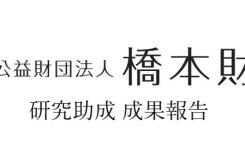 NPO法人岡山県国際団体協議会
NPO法人岡山県国際団体協議会岡山県国際団体協議会の記事を見る
-
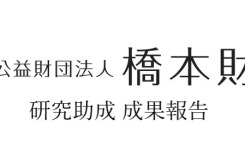 岡山大学 学術研究院 社会文化科学学域 教授東條 光彦
岡山大学 学術研究院 社会文化科学学域 教授東條 光彦東條 光彦の記事を見る
-
 福岡大学 名誉教授田村 和夫
福岡大学 名誉教授田村 和夫田村 和夫の記事を見る
-
 ソシエタス総合研究所 研究員相川 真穂
ソシエタス総合研究所 研究員相川 真穂相川 真穂の記事を見る
-
 一般社団法人京都総合科学研究所 アドバイザー松村 道郎
一般社団法人京都総合科学研究所 アドバイザー松村 道郎松村 道郎の記事を見る
-
 ワラム株式会社 代表取締役加藤 侑子
ワラム株式会社 代表取締役加藤 侑子加藤 侑子の記事を見る
-
 岡山市立操南中学校 教諭/NPO法人国際協力研究所・岡山代表理事竹島 潤
岡山市立操南中学校 教諭/NPO法人国際協力研究所・岡山代表理事竹島 潤竹島 潤の記事を見る
-
 新西横浜街の予防医療ケア研究室 保健師・看護師・元先端バイオ創薬ベンチャー取締役五十嵐 直敬
新西横浜街の予防医療ケア研究室 保健師・看護師・元先端バイオ創薬ベンチャー取締役五十嵐 直敬五十嵐 直敬の記事を見る
-
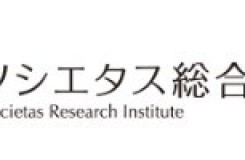 共著橋本俊明・秋吉湖音
共著橋本俊明・秋吉湖音橋本俊明・秋吉湖音の記事を見る
-
 ライター菊池 洋勝
ライター菊池 洋勝菊池 洋勝の記事を見る
-
 大東文化大学国際関係学部・特任教授 高崎経済大学経済学部・非常勤講師 目白大学経営学部経営学科&目白大学大学院経営学研究科 非常勤講師 長崎県佐世保市役所 経済活性化~産業振興に関するアドバイザー、博士(経済学)江崎 康弘
大東文化大学国際関係学部・特任教授 高崎経済大学経済学部・非常勤講師 目白大学経営学部経営学科&目白大学大学院経営学研究科 非常勤講師 長崎県佐世保市役所 経済活性化~産業振興に関するアドバイザー、博士(経済学)江崎 康弘江崎 康弘の記事を見る
-
 ソシエタス総合研究所 研究員秋吉 湖音
ソシエタス総合研究所 研究員秋吉 湖音秋吉 湖音の記事を見る
-
 JICA専門家足立 伸也
JICA専門家足立 伸也足立 伸也の記事を見る
-
 富士通株式会社 第三ファイナンス事業本部 シニアマネージャー安留 義孝
富士通株式会社 第三ファイナンス事業本部 シニアマネージャー安留 義孝安留 義孝の記事を見る
-
 EDAS(イーダス)理事長田村 拓
EDAS(イーダス)理事長田村 拓田村 拓の記事を見る
-
 監督・プロデューサー湯浅 典子
監督・プロデューサー湯浅 典子湯浅 典子の記事を見る
-
 日本経済大学 准教授山下 誠矢
日本経済大学 准教授山下 誠矢山下 誠矢の記事を見る
-
 人と医療の研究室 代表池尻 達紀
人と医療の研究室 代表池尻 達紀池尻 達紀の記事を見る
-
 一般社団法人飛島学園 代表理事堂野 博之
一般社団法人飛島学園 代表理事堂野 博之堂野 博之の記事を見る
-
 ニッセイ基礎研究所 生活研究部 主任研究員、ヘルスケアリサーチセンター・ジェロントロジー推進室兼任金 明中
ニッセイ基礎研究所 生活研究部 主任研究員、ヘルスケアリサーチセンター・ジェロントロジー推進室兼任金 明中金 明中の記事を見る
-
 医療法人財団足立病院 理事長、社会福祉法人あだち福祉会 理事長畑山 博
医療法人財団足立病院 理事長、社会福祉法人あだち福祉会 理事長畑山 博畑山 博の記事を見る
-
 教育研究家、合同会社ライフ&ワーク代表妹尾 昌俊
教育研究家、合同会社ライフ&ワーク代表妹尾 昌俊妹尾 昌俊の記事を見る
-
 ハーバード大学ベス・イスラエル・ディーコネス・メディカルセンター、高度消化管/最小侵襲外科フェロー中元 啓太郎
ハーバード大学ベス・イスラエル・ディーコネス・メディカルセンター、高度消化管/最小侵襲外科フェロー中元 啓太郎中元 啓太郎の記事を見る
-
 ソシエタス総合研究所 主任研究員井上 登紀子
ソシエタス総合研究所 主任研究員井上 登紀子井上 登紀子の記事を見る
-
 ソシエタス総合研究所 研究員松田 郁乃
ソシエタス総合研究所 研究員松田 郁乃松田 郁乃の記事を見る
-
 ソシエタス総合研究所 研究員アイシェ・ウルグン・ソゼン Ayse Ilgin Sozen
ソシエタス総合研究所 研究員アイシェ・ウルグン・ソゼン Ayse Ilgin Sozenアイシェ・ウルグン・ソゼン Ayse Ilgin Sozenの記事を見る
-
 NPO法人岡山市子どもセンター 事務局久川 春菜
NPO法人岡山市子どもセンター 事務局久川 春菜久川 春菜の記事を見る
-
 ユースワーカー(Youth Woker)森分 志学
ユースワーカー(Youth Woker)森分 志学森分 志学の記事を見る
-
 ペンネーム三村 喜久雄
ペンネーム三村 喜久雄三村 喜久雄の記事を見る
-
 ペンネーム黒木 洋一郎
ペンネーム黒木 洋一郎黒木 洋一郎の記事を見る
-
 NPO法人チャリティーサンタ 理事河津 泉
NPO法人チャリティーサンタ 理事河津 泉河津 泉の記事を見る
-
 金沢大学人間社会学域地域創造学類・准教授 、特定非営利活動法人国土利用再編研究所・理事長林 直樹
金沢大学人間社会学域地域創造学類・准教授 、特定非営利活動法人国土利用再編研究所・理事長林 直樹林 直樹の記事を見る
-
 認定NPO法人ペアレント・サポートすてっぷ理事長安藤希代子
認定NPO法人ペアレント・サポートすてっぷ理事長安藤希代子安藤希代子の記事を見る
-
 カリフォルニア大学サンフランシスコ校小児胸部心臓外科教授佐野俊二
カリフォルニア大学サンフランシスコ校小児胸部心臓外科教授佐野俊二佐野俊二の記事を見る
-
 社会福祉法人 旭川荘 ひらたえがお保育園 園長江田 加代子
社会福祉法人 旭川荘 ひらたえがお保育園 園長江田 加代子江田 加代子の記事を見る
-
 NPO法人 おかやまUFE 副理事長 ・NPO法人 おかやまUFE 事務局阪井 ひとみ・永松千恵
NPO法人 おかやまUFE 副理事長 ・NPO法人 おかやまUFE 事務局阪井 ひとみ・永松千恵阪井 ひとみ・永松千恵 の記事を見る
-
 社会学者 東京大学名誉教授 認定NPO法人ウィメンズアクションネットワーク(WAN)理事長 上野 千鶴子
社会学者 東京大学名誉教授 認定NPO法人ウィメンズアクションネットワーク(WAN)理事長 上野 千鶴子上野 千鶴子 の記事を見る
-
 外務省 国際保健政策室長 鷲見 学
外務省 国際保健政策室長 鷲見 学鷲見 学の記事を見る
-
 プロ・アダプティブ・サーファー藤原(旧姓:川上)智貴
プロ・アダプティブ・サーファー藤原(旧姓:川上)智貴藤原(旧姓:川上)智貴の記事を見る
-
 京都大学霊長類研究所 教授正高信男
京都大学霊長類研究所 教授正高信男正高信男の記事を見る
-
 社会医療法人石川記念会HITO病院緩和ケア内科統括部長大坂巌
社会医療法人石川記念会HITO病院緩和ケア内科統括部長大坂巌大坂巌の記事を見る
-
 東京医療学院大学保健医療学部教授上田 諭
東京医療学院大学保健医療学部教授上田 諭上田 諭の記事を見る
-
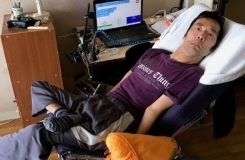 「夢を叶える145」ライター宮村孝博
「夢を叶える145」ライター宮村孝博宮村孝博の記事を見る
-
 NPO法人 Anneの家 代表 美作地区里親会会員松本芳也・淳子夫妻
NPO法人 Anneの家 代表 美作地区里親会会員松本芳也・淳子夫妻松本芳也・淳子夫妻の記事を見る
-
 特定非営利活動法人あかね 代表理事中山 遼
特定非営利活動法人あかね 代表理事中山 遼中山 遼の記事を見る
-
 大阪市立総合医療センター 緩和医療科部長 兼 緩和ケアセンター長 大阪市立大学医学部臨床准教授 一般社団法人「こどものホスピスプロジェクト」常務理事 日本小児科学会専門医 英国カーディフ大学緩和ケア認定医(Certificate in Palliative Care) 日本緩和医療学会暫定多田羅竜平
大阪市立総合医療センター 緩和医療科部長 兼 緩和ケアセンター長 大阪市立大学医学部臨床准教授 一般社団法人「こどものホスピスプロジェクト」常務理事 日本小児科学会専門医 英国カーディフ大学緩和ケア認定医(Certificate in Palliative Care) 日本緩和医療学会暫定多田羅竜平多田羅竜平の記事を見る
-
 NPO法人 岡山マインド「こころ」/代表理事 一般社団法人お互いさま・まびラボ/副代表理事多田伸志
NPO法人 岡山マインド「こころ」/代表理事 一般社団法人お互いさま・まびラボ/副代表理事多田伸志多田伸志の記事を見る
-
 一般社団法人MY TREE代表理事 MY TREEペアレンツ・プログラムスーパーバイザー 認定フェミニストカウンセラー (公認心理師)中川和子
一般社団法人MY TREE代表理事 MY TREEペアレンツ・プログラムスーパーバイザー 認定フェミニストカウンセラー (公認心理師)中川和子中川和子の記事を見る
-
 兵庫県立ひょうごこころの医療センター精神科医師小田 陽彦
兵庫県立ひょうごこころの医療センター精神科医師小田 陽彦小田 陽彦の記事を見る
-
 独立行政法人国立病院機構福山医療センター院長岩垣博己・堀井城一朗・矢野 平
独立行政法人国立病院機構福山医療センター院長岩垣博己・堀井城一朗・矢野 平岩垣博己・堀井城一朗・矢野 平の記事を見る
-
 岡山大学 教授 文学部長田中 共子
岡山大学 教授 文学部長田中 共子田中 共子の記事を見る
-
 Civil Engineer (仕組みつくりの技術者)石田篤史
Civil Engineer (仕組みつくりの技術者)石田篤史石田篤史の記事を見る
-
 一般財団法人キヤノングローバル戦略研究所 研究主幹・経済学博士松山幸弘
一般財団法人キヤノングローバル戦略研究所 研究主幹・経済学博士松山幸弘松山幸弘の記事を見る
-
 岡山大学生殖補助医療技術教育研究センター ART教育研究部門長・教授舟橋 弘晃
岡山大学生殖補助医療技術教育研究センター ART教育研究部門長・教授舟橋 弘晃舟橋 弘晃の記事を見る
-
 医療法人サンズ理事長浅野 直
医療法人サンズ理事長浅野 直浅野 直の記事を見る
-
 株式会社ヘリオス 代表執行役社長CEO鍵本忠尚
株式会社ヘリオス 代表執行役社長CEO鍵本忠尚鍵本忠尚の記事を見る
-
 慶應義塾大学文学部人間科学専攻教授(医療人類学) McGill大学人類学部・医療社会研究学部Ph.D.北中淳子
慶應義塾大学文学部人間科学専攻教授(医療人類学) McGill大学人類学部・医療社会研究学部Ph.D.北中淳子北中淳子の記事を見る
-
 岡山大学病院 緩和支持医療科片山英樹
岡山大学病院 緩和支持医療科片山英樹片山英樹の記事を見る
-
 岡山市役所 保健福祉企画総務課松岡克朗
岡山市役所 保健福祉企画総務課松岡克朗松岡克朗の記事を見る
-
 近現代史研究家青木康嘉
近現代史研究家青木康嘉青木康嘉の記事を見る
-
 独立行政法人国立病院機構福山医療センター院長岩垣博己・長谷川利路・中島正勝
独立行政法人国立病院機構福山医療センター院長岩垣博己・長谷川利路・中島正勝岩垣博己・長谷川利路・中島正勝の記事を見る
-
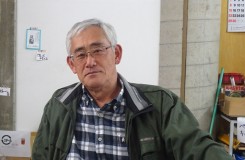 岡山高等学院 副校長 水野文一郎
岡山高等学院 副校長 水野文一郎水野文一郎の記事を見る
-
 社会の仕組み屋、社会の編集者石原 達也
社会の仕組み屋、社会の編集者石原 達也石原 達也の記事を見る
-
 一般社団法人SGSG理事長/中国学園大学子ども学部講師野村泰介
一般社団法人SGSG理事長/中国学園大学子ども学部講師野村泰介野村泰介の記事を見る
-
 一橋大学経済研究所 教授神林 龍
一橋大学経済研究所 教授神林 龍神林 龍の記事を見る
-
 特定医療法人自由会 理事 (社会福祉法人敬友会 理事、公益財団法人橋本財団 理事)橋本 健二
特定医療法人自由会 理事 (社会福祉法人敬友会 理事、公益財団法人橋本財団 理事)橋本 健二橋本 健二の記事を見る
-
 医療法人社団 岡山二人クリニック 理事長、医学博士林 伸旨
医療法人社団 岡山二人クリニック 理事長、医学博士林 伸旨林 伸旨の記事を見る
-
 フリーライター渡辺嗣郎(わたなべ しろう)
フリーライター渡辺嗣郎(わたなべ しろう)渡辺嗣郎(わたなべ しろう)の記事を見る
-
 国立大学法人岡山大学 副理事(国際担当)横井 篤文
国立大学法人岡山大学 副理事(国際担当)横井 篤文横井 篤文の記事を見る
-
 ペンネームドクターX
ペンネームドクターXドクターXの記事を見る
-
 NPO法人 山村エンタープライズ 代表理事藤井裕也
NPO法人 山村エンタープライズ 代表理事藤井裕也藤井裕也の記事を見る
-
 キャンサー・ソリューションズ株式会社 代表取締役社長桜井 なおみ
キャンサー・ソリューションズ株式会社 代表取締役社長桜井 なおみ桜井 なおみの記事を見る
-
 AMDA(アムダ) グループ代表・認定非営利活動法人AMDA 理事長菅波 茂
AMDA(アムダ) グループ代表・認定非営利活動法人AMDA 理事長菅波 茂菅波 茂の記事を見る
-
 ふれあい歯科ごとう代表五島 朋幸
ふれあい歯科ごとう代表五島 朋幸五島 朋幸の記事を見る
-
 介護従事者髙田 浩一
介護従事者髙田 浩一髙田 浩一の記事を見る
-
 ケアマネ-ジャー・社会福祉士かえる ちから
ケアマネ-ジャー・社会福祉士かえる ちからかえる ちからの記事を見る
-
 五常・アンド・カンパニー株式会社 代表取締役社長慎 泰俊
五常・アンド・カンパニー株式会社 代表取締役社長慎 泰俊慎 泰俊の記事を見る
-
 NPO法人 ポケットサポート代表理事三好 祐也
NPO法人 ポケットサポート代表理事三好 祐也三好 祐也の記事を見る
-
 医療法人 寺田病院 院長板野 聡
医療法人 寺田病院 院長板野 聡板野 聡の記事を見る
-
 鳥取市立病院 地域医療総合支援センター 生活支援室 副室長、リハビリテーション部 副部長、歯科 医長目黒 道生
鳥取市立病院 地域医療総合支援センター 生活支援室 副室長、リハビリテーション部 副部長、歯科 医長目黒 道生目黒 道生の記事を見る
-
 鳥取市立病院地域医療総合支援センター長 鳥取市福祉部参与足立 誠司
鳥取市立病院地域医療総合支援センター長 鳥取市福祉部参与足立 誠司足立 誠司の記事を見る
-
 ペンネーム池井戸 高志
ペンネーム池井戸 高志池井戸 高志の記事を見る
-
 ペンネーム池田 出水
ペンネーム池田 出水池田 出水の記事を見る
-
 岡山大学大学院ヘルスシステム統合科学研究科教授松岡 順治
岡山大学大学院ヘルスシステム統合科学研究科教授松岡 順治松岡 順治の記事を見る
-
 鳥取市立病院 名誉院長田中 紀章
鳥取市立病院 名誉院長田中 紀章田中 紀章の記事を見る
-
 岡山大学大学院保健学研究科 副研究科長 教授齋藤 信也
岡山大学大学院保健学研究科 副研究科長 教授齋藤 信也齋藤 信也の記事を見る
-
 公益財団法人橋本財団 理事長、医学博士橋本 俊明
公益財団法人橋本財団 理事長、医学博士橋本 俊明橋本 俊明の記事を見る

